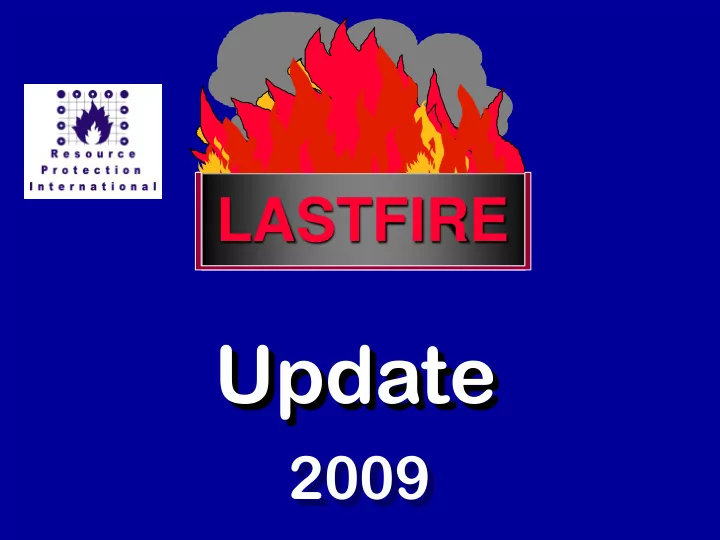

LASTFIRE Update 2009
LASTFIRE Large Atmospheric Storage Tank Fires
LASTFIRE An industry consortium of international oil companies reviewing risks associated with storage tank fires
LASTFIRE Member commitments Two Steering Group members Questionnaire completion Suggest issues for review Advise coordinator on relevant issues / experiences Host meetings Encourage membership
• New LASTFIRE Website • Incident Survey – Questionnaire • WM Fuels LASTFIRE Test • Vapour Suppression Work
New LASTFIRE Website www.lastfire.co.uk
LASTFIRE Incident Survey • Atmospheric Tanks • OTFR • Internal Floating Roof • Fixed Roof • Pressurised Storage • Bullets • Spheres Fires and spills Available to members only!
FLOATING ROOF TANK FIRE SCENARIOS Rimseal Fire Spill on Roof Fire Full Surface Fire Bund Fire Pontoon Explosion
FIX IXED ED ( CON CONE E ) RO ROOF OF TANK NK FIR IRE E SCE CENARIOS ARIOS Vent nt Fir ire Vapo pour ur Sp Space Ex Expl plos osion ion Fu Full ll Su Surface ace Fir ire Bun und d Fir ire
IN INTE TERN RNAL AL ( CO COVERED VERED ) FL FLOATING TING ROOF OF TANK NK FIR IRE E SCE CENARIOS ARIOS Vent ent Fir ires es
LASTFIRE BOILOVER STUDY
Basic Analysis • Time to boilover • Effect of water/fuel quantity • Fire spread • Tank wall temperatures • Effect of crude composition • Refined products / Biofuels • Model validation • Foam application vs time
Basic Analysis • Multi boilovers possible • Hot zone >2m/hr • Spread >10d • Tank wall temperature or noise not definitive guides
Future study • Cooperate with IFIF – Rotterdam • Methods of delaying boilover • Methods of preventing boilover • Test to be carried out March 2010 • Additives • Surface covering • Effect on foam application
LASTFIRE WM Fuels LASTFIRE Foam Test Development
Objectives • To develop the long established LASTFIRE Foam Test for Storage Tank Fires methodology to suit assessment of foams on polar solvents and water miscible (WM) fuels • To establish test parameters / methodology • To establish best application rates • To trial test equipment • Nozzles • Pan / backboard
Outcome • Testing has established: • Preburn time – 3 minutes • Foam application durations – 7 mins • Application rates • Vapour seal testing • Burnback methodology • Equipment usage • Nozzle performance Full specification developed
LASTFIRE Vapour Suppression Research
Initial Objectives • Measure vapours above unignited pools • Effectiveness of low expansion foam on vapour suppression (different types e.g. FP/MP) • Effect of foam quality • Effect of application rate • Effect of solution strength • Effectiveness over time
Gasoline LASTFIRE Tank (2.44m diameter)
Sensors
Oxygen Cells Test 5 Ch 0 Av 4.1% Fuel Test 5 (Gasoline) Ch 1 Av 2.8% Fuel Cells above Foam Ch 2 Av 1.3% Fuel Exposed to air Ch 3 Av 0.8% Fuel 104 Ch 4 Av 0.4% Fuel Above fuel surface 102 100 Air (%) 98 96 94 92 90 11.35 11.45 11.55 11.65 11.75 11.85 Time (hour)
“Handheld” (personal) LEL monitor used with lance / aspirator
Foam Application (Monitor nozzle)
Measurements made throughout foam deterioration – up to 3 hours +
Observations • FP based and MP foams appear effective at reducing vapour concentration above pool and around tank to <20% LEL for periods in excess of normal drainage time of foam solution • Wind a big factor in destroying blanket and possibly vapour suppression once foam solution has drained. • Only severe agitation of foam blanket appears to reduce suppression effectiveness
Hot Fuel Test – October 09 • How will foams suppress vapours on hot fuels? • What top-up period? • Drainage time vs. vapour suppression • Gasoline used • 3 minute preburn • Foam application until extinguishment only
Hot Fuel Test – Findings • Foam rapidly cooled fuel even after a 3 minute preburn • Fuel temperature in the order of 35 o C • Less than 2% LEL measured for over 2 hours • Foam still very effective at reducing vapour concentration above the pool, as in the cold fuel test Full findings only available to Lastfire Members
Measurement of Incident Radiation
Compilation of Incident Radiation Measurements Tests 3, 4, 6, 7, 8, 9 and 10 140 85% Ethanol - 15% Gasoline and 100% Gasoline 120 Ethanol 100 Radiation (kW/m2) 80 60 40 20 0 0 2 4 6 8 10 Distance from Centre of 2.4 m Pan (m)
Temperatures in Small Tank Test 4 Temp 0 Test 4 (85% Ethanol - 15% Gasoline) Temp 1 Temp 2 50 45 40 35 Temp (C) 30 25 20 15 10 5 0 0 5 10 15 20 25 30 Time (min)
Fighting Floating Roof Tank Rimseal Fires
More Information about LASTFIRE Deliverables from: Resour source ce Pr Protection otection In Interna ternation tional al Walk lker er Ho House se, , George e Street, eet, A Aylesb lesbury ury, , Bucks HP HP20 20 2HU HU, , UK UK T: : +4 +44 (0) 1296 96 39931 9311 F: : +4 +44 (0) 1296 96 395669 5669 e-mail: ramsden@resprotint.co.uk website: www.resprotint.co.uk
Recommend
More recommend